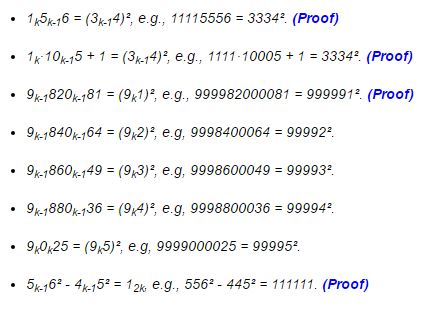Curious Identities Involving Integer Squares
One characteristic feature of the identities below is the inclusion of integers with long sequences of equal successive digits. To make describing such numbers a manageable undertaking, I'll use subscripts to denote the number of repetitions of a digit, e.g., $1_{5}3_{2}$ will denote $1111133,$ i.e., five 1s followed by two $3s.$ In general, $d_{n}$ means a sequence of $n$ $d's.$
The following identities come from the Mathematics Magazine, Vol. 35, No. 2 (March-April, 1962). For
$1_{k}5_{k-1}6 = (3_{k-1}4)^{2},$ e.g., $11115556 = 3334^{2}.$ (Proof)
$1_{k}\cdot 10_{k-1}5 + 1 = (3_{k-1}4)^{2},$ e.g., $1111\cdot 10005 + 1 = 3334^{2}.$ (Proof)
$9_{k-1}820_{k-1}81 = (9_{k}1)^{2},$ e.g., $999982000081 = 999991^{2}.$ (Proof)
$9_{k-1}840_{k-1}64 = (9_{k}2)^{2},$ e.g, $9998400064 = 99992^{2}.$
$9_{k-1}860_{k-1}49 = (9_{k}3)^{2},$ e.g, $9998600049 = 99993^{2}.$
$9_{k-1}880_{k-1}36 = (9_{k}4)^{2},$ e.g, $9998800036 = 99994^{2}.$
$9_{k}0_{k}25 = (9_{k}5)^{2},$ e.g, $9999000025 = 99995^{2}.$
$5_{k-1}6^{2} - 4_{k-1}5^{2} = 1_{2k},$ e.g., $556^{2} - 445^{2} = 111111.$ (Proof)
$90_{k}60_{k}1=30_{k}1^{2},$ e.g., $900060001=30001^{2}.$
$10_{k}20_{k}1=10_{k}1^{2},$ e.g., $100020001=10001^{2}.$
Subscripts can be easily converted to decimal notations. Observe that
$1_{t} = 9_{t} / 9 = (10^{t} - 1) / 9.$
So, for example,
$\begin{align}3_{k}5_{m}6_{n}7 &= 7 + 10\cdot 6\cdot (10^{n} - 1) / 9 + 10^{n + 1}\cdot 5\cdot (10^{m} - 1) / 9\\ &\qquad\qquad\qquad\qquad\qquad + 10^{m + n + 1}\cdot 3\cdot (10^{k} - 1) / 9.\end{align}$
Number Curiosities
- Number 8 Is Interesting
- Curious Identities Involving Integer Squares
- Curious Identities Involving Integer Products
- Decimal Sums of Successive Integers
- Curious Identities In Pythagorean Triangles
- Hardy's Example of Non-Serious Theorems
|Contact| |Front page| |Contents| |Arithmetic|
Copyright © 1996-2018 Alexander Bogomolny
$1_{k}5_{k-1}6 = (3_{k-1}4)^{2}.$
$\begin{align}1_{k}5_{k-1}6&= 6 + 50\cdot (10^{k-1} - 1) / 9 + 10^{k} (10^{k} - 1)/9\\ &=6 + 5\cdot 10^{k} / 9 + 10^{2k} / 9 + 6 - 50/9 - 10^{k}/9\\ &=(4\cdot 10^{k} + 10^{2k} + 4)/9\\ &=[(10^{k} + 2) / 3]^{2}.\\ \end{align}$
|Contact| |Front page| |Contents| |Arithmetic|
Copyright © 1996-2018 Alexander Bogomolny
$1_{k}\cdot 10_{k-1}5 + 1 = (3_{k-1}4)^{2}$
$\begin{align}1_{k}\cdot 10_{k-1}5 + 1&= (10^{k}-1)/9 \times (10^{k} + 5) + 1\\ &=(10^{2k} - 10^{k} + 5\cdot 10^{k} - 5) / 9 + 1\\ &=(10^{2k} + 4\cdot 10^{k} + 4) / 9\\ &=[(10^{k} + 2) / 3]^{2}.\\ \end{align}$
|Contact| |Front page| |Contents| |Arithmetic|
Copyright © 1996-2018 Alexander Bogomolny
$9_{k-1}820_{k-1}81 = (9_{k}1)^{2}.$
$\begin{align} 9_{k}1^{2}&= (10(10^{k} - 1) + 1)^{2}\\ &=(10^{k+1} - 9)^{2}\\ &=10^{2k+2} - 18\cdot 10^{k+1} + 81\\ &=10^{2k+2} - (20 - 2)\cdot 10^{k+1} + 81\\ &=10^{2k+2} - 2\cdot 10^{k+2} + 2\cdot 10^{k+1} + 81\\ &=10^{k+2}(10^{k} - 2) + 2\cdot 10^{k+1} + 81\\ &=10^{k+2}(10(10^{k-1} - 1) + 8) + 2\cdot 10^{k+1} + 81\\ &=10^{k+3}(10^{k-1} - 1) + 8\cdot 10^{k+2} + 2\cdot 10^{k+1} + 81\\ &=10^{k+3}(10^{k-1} - 1) + 82\cdot 10^{k+1} + 81\\ &=9_{k-1}820_{k-1}81.\\ \end{align}$
|Contact| |Front page| |Contents| |Arithmetic|
Copyright © 1996-2018 Alexander Bogomolny
$5_{k-1}6^{2} - 4_{k-1}5^{2} = 1_{2k}.$
$\begin{align} 5_{k-1}6^{2} - 4_{k-1}5^{2}&= 1_{k}\cdot 10_{k}1\\ &=1_{2k}.\\ \end{align}$
To remind:

|Contact| |Front page| |Contents| |Arithmetic|
Copyright © 1996-2018 Alexander Bogomolny
73731912
